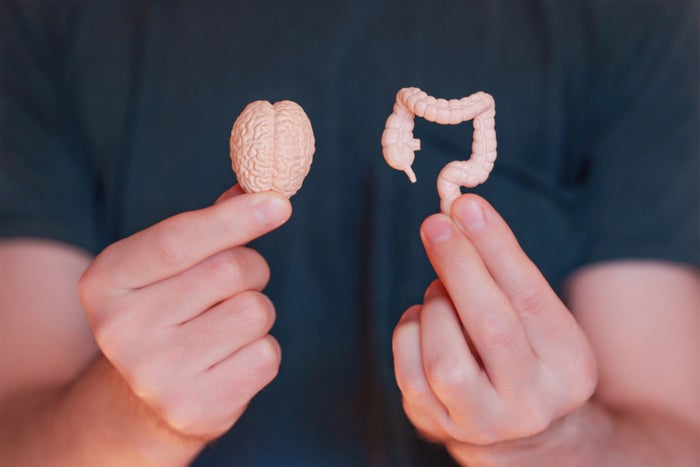
Have you ever wondered why your mood, energy levels, and overall wellbeing seem to be closely tied to your digestive health? The answer lies in the fascinating relationship between your gut and your hormones.
Our gut microbiome is home to trillions of microbes. These play a vital role in regulating our hormones, which can influence our appetite, blood sugar, metabolism, and may even fertility.
Managing the complex connection between gut health and hormones is essential to our overall well-being. When your gut is healthy, it can perform at its best to support balanced hormones. But when gut health falters, it can lead to hormonal imbalances. This relationship is often referred to as the gut-brain axis and demonstrates how the digestive and endocrine systems work together to maintain balance in the body. The gut-brain axis is just one pathway that is involved in hormone regulation!
What is the Endocrine System?
Your gut is more than just a digestive powerhouse – it's also one of the largest endocrine organs in your body. The endocrine system is a group of tissues that together produce and regulate various hormones that affect several bodily functions, including:
- Appetite and satiety
- Mood and mental health
- Immune function
- Metabolism
Gut Microbiome and Hormone Regulation
The trillions of microorganisms in the gut, known as the gut microbiome, have a significant effect on hormone levels. These microbes help to metabolise and produce hormones, so any imbalance in gut bacteria can lead to imbalances.
Estrogen Metabolism: Certain microorganisms including gut bacteria are responsible for metabolising estrogen [1], and together are referred to as the ‘estrobolome’. This helps to break down excess estrogen, modulating levels and ensuring a healthy balance is maintained. Any disruption in the gut microbiome can lead to imbalanced estrogen levels and contribute to conditions like fatigue or mood swings.
Gut Health and Menopause: The connection between the gut microbiome and estrogen is linked to several conditions experienced during menopause, such as changes to the body’s metabolism.[2]Menopause can disrupt microorganism balances in the gut, so supporting the microbiome during this time may help to alleviate some of the common symptoms.
Cortisol Balance: Cortisol, sometimes called the stress hormone, helps the body respond to stress by releasing stored glucose to provide energy. A healthy gut microbiome helps regulate cortisol levels, potentially lowering anxiety and depression.[3]
Insulin Sensitivity: Gut bacteria play a major role in how sensitive our bodies are to insulin. A healthy gut microbiome increases sensitivity levels while an imbalanced microbiome can increase insulin resistance. This means maintaining a healthy gut can help reduce the risk of conditions like type 2 diabetes.[4]
The Impact of Gut Health on Hormonal Balance

Your gut microbiome and hormone health are closely interlinked, and changes to gut health balance can quickly affect hormone production in some of the following ways:
- Leaky Gut Syndrome: Unhealthy gut linings may become permeable, allowing toxins to penetrate the tissues beneath and leading to inflammation as well as disrupting hormone production and regulation.[5]
- Dysbiosis: An imbalance in gut bacteria (dysbiosis) can further impact hormone levels, affecting estrogen metabolism, mood, and bile acid production.[6] As beneficial bacteria are lost or potentially harmful ones overgrow, the body’s ability to regulate hormones is disrupted.
- Nutrient Malabsorption: Poor gut health can impair the body’s ability to absorb key nutrients like some b vitamins, such as folate (B9) and cobalamin (B12), which are essential for hormone balance and overall well-being.[7]
Tips to Support Gut-Hormone Health
Supporting a healthy gut-hormone balance is key to maintaining a happy, healthy body. The following steps can all help to keep this balance under control:
1. Eat a Diverse Diet: Include plenty of fibre rich fruits, vegetables, and whole grains to feed beneficial gut bacteria.
2. Incorporate Fermented Foods: Yogurt, kefir, and sauerkraut can introduce beneficial probiotics to your gut.
3. Manage Stress: Chronic stress can negatively impact both gut health and hormone balance. Practice stress-reduction techniques like meditation or yoga.
4. Limit Processed Foods: High-sugar and highly processed foods low in nutrients can disrupt the gut microbiome and hormone levels.
5. Stay Hydrated: Adequate water intake supports digestive health and hormone transport.
6. Consider Prebiotic Supplements: Under guidance from a healthcare professional, prebiotic supplements may help support gut health.
While Bimuno can’t help you with these first five steps, our unique, high in fibre prebiotic supplements can provide the final missing piece of any gut health regime. Bimuno Original supports good gut bacteria, helping you balance your gut microbiome to maintain healthy hormone levels.

[2] https://www.ncbi.nlm.nih.gov/pmc/articles/PMC9379122/
[3] https://www.healthline.com/health/hormonal-imbalance
[5] https://www.talkspace.com/mental-health/conditions/articles/anxiety-hormones-connection/
[4] https://drjennarayachoti.com/blog/leaky-gut-and-hormone-imbalances

Related Articles








